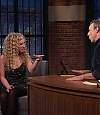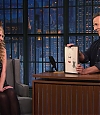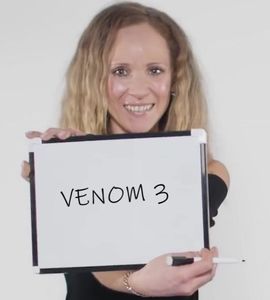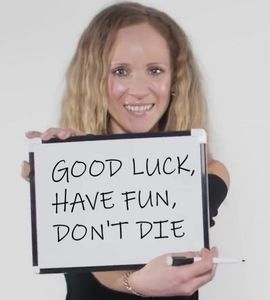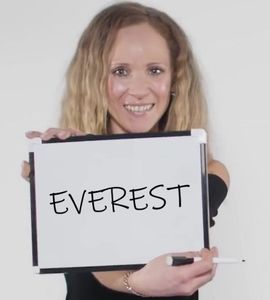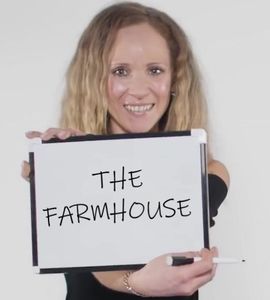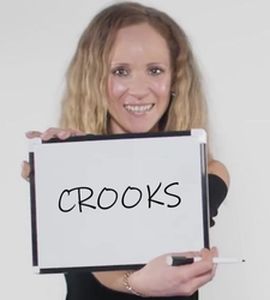The independent movie site Hommage has featured Juno’s most recent short film, the visually stunning drama ‘The Call’, which tells so much in so little time. On the page dedicated to this movie, the site’s owner interviewed the director/writer/producer of ‘The Call’, Aisha Schliessler, and of course, they’ve talked in detail about Ms. Temple’s contribution. (We’ve only included the parts that are strictly about her, M means Mark Shaba, the owner of Hommage, A is our director, Aisha Schliessler, the cursive letters are our own additions.) Click the READ MORE tag to see the interview!
(…)
M: I love small but very telling moments in cinema so I was really moved when Kate took one bite of pizza before placing the slice in the sink. So I would love to know, when did you come up with the idea to include this moment in the film? Was it always part of the script, or did you discover it later during rehearsals/filming with Juno?
A: Taking the bite of pizza from the fridge was in the script, but Juno elevated the moment by placing it in the sink. I had discussed with her the idea of making choices that were subtle but a little ‘off’ to emphasize the slow unraveling of the character.
M: And then more broadly, I was interested in how you show Kate’s inner feelings & journey through action & movement (…). So I wouldn’t be surprised if all of these actions & moments were part of the script, but I’m just curious as to how much you allowed Juno to bring her own ideas & improvise on set. Can you please tell us about how you worked with Juno to fill space with action that reflects her character’s emotions & journey?
A: Yes! Most of these specific moments were in the script but Juno did an incredible job of bringing them to life in an interesting way. Kate curling up on the ground at the end was improvised by Juno and as soon as she did it, I knew it was the right choice. I like to rehearse with actors and give them the freedom to move where it feels natural, so it was a blessing to work with Juno who is so open and in touch with her body. During rehearsal, we talked about what the character was feeling moment-to-moment and to let those emotions guide the overall energy and flow within the space.
I wanted to utilize multiple areas and rooms as from my personal experience, I tend to pace when I’m anxious on a phone call. For the actions like getting into the pool, tossing the cigarette and breaking the glass, I wanted to show this woman who seemingly has it all together slowing falling apart – the stuff you do when you’re in shock and don’t give a fuck. (This here is not our edit, the curse word was like this in the original interview, which is always a relief to see, because cursing is a part of life, and trying to look like it isn’t is unnatural.) But in staying true to her character, Juno does it elegantly and with poise. There’s something powerful about playing the opposite of your feelings on screen, like not crying despite being so sad, or just dropping a glass instead of smashing it against the wall when you’re so mad. This feels real to me, and was something I wanted to explore in the film.
M: I would really like to hear about your approach to directing an actor who’s playing multiple characters in the same film. Did you very carefully plan & ensure that Juno played both roles with specific differences & nuances, or in the case of an experienced & talented actress like Juno, did you trust her to take charge of crafting subtle differences between her performance of both characters?
A: The idea for the same actor to play both roles came to me while I was writing the script. I thought it would be an interesting challenge and as well as provide a different and more abstract interpretation of the film (which I’ll leave to the viewer!). Juno was immediately on board as she had never played two characters in the same project prior to this film. (This isn’t true, because in ’Jack and Diane’, Diane has a twin sister, who does porn, and we see some snippets, it’s Juno with a wig on. Plus in ’Electric Dreams’, the woman in the flashbacks turns out to be not entirely the same as the one who sees the flashbacks.) Since you never see Ella, it was important that we set her apart from the very first word we hear her say. I knew Juno could do an amazing American accent, so we decided to have her be American on screen and play Ella with her native tongue. (Didn’t noticed this, to be honest.) During our first meeting, we discussed at length the personality differences of both characters as well as their backstory and relationship. It was fun to hear Juno’s interpretation of each woman based on the script and then get into the nitty-gritty details of how she would make them personal. Again, it’s such a blessing to work with an actor who is so passionate about their craft and can come forward with unique and interesting choices. This is what I love about filmmaking – the collaboration. For the actual execution, we decided to record all of Ella’s dialogue first so that Juno would loosely know what she was responding to on camera. We then shot the film and went back to re-record Ella’s dialogue to make sure her lines matched up with anything we changed on set. It was a bit of a ping-pong but in the final edit we used parts of both recording sessions, and it worked out great. (The text suggest Ms. Temple was reacting on her own dialogue from memory in the movie. If that’s true, then this is an incredible thing to do!)
(…)
Mark’s Final Thoughts
Really enjoyed reading about Aisha’s collaboration & process with Juno – lots of great insights. I think Aisha’s answers reflect Juno’s performance on screen as you get the feeling that her character’s actions are intentional & purposeful without ever completely losing elements of mystery, nuance & surprise.
Here’s the original, full interview, where Aisha talks about herself as a person & as a filmmaker, plus more interesting facts about ‘The Call’ – if you haven’t watched it, the movie is free to stream in the link and here in our own link.


